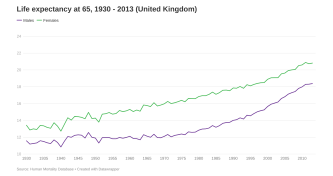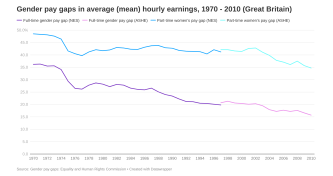Source: Office for National Statistics – Pension Trends – Chapter 4: The Labour Market and Retirement
Notes:
- Annual data for period 1984 to 1991. April to June data for 1992 to 2012.
- Data not seasonally adjusted.
- There are currently two different approaches to estimating the average age of withdrawal from the labour market (or exit age indicators), both based on probability measures. The Office for National Statistics now favours what is known as the ‘dynamic’ approach, but this measure can only be produced from 2004 onwards. In order to look at change over a longer period, the chart shown here is based on the ‘static’ approach. This was developed for the International Labour Organisation in 1996 and is concerned with the ratio of the economic activity rates between two age groups (age a and age a-1) within the same year. Full details of the calculation, advantages and disadvantages of these different approaches can be found here.
| Key dates | |
|---|---|
| 1995 | Pensions Act Women's state pension age would be increased from 60 to 65, making it equal with men, over a transitional period between 2010 and 2020. |
| 2007 | Pension Act The state pension age for both men and women would be gradually increased to 66 between 2024 and 2026, 67 by 2036 and 68 by 2046. |
| 2011 | Pensions Act Brought forward the planned increase in women’s state pension age to 65 to 2018, and the increase to 66 for both men and women to 2020. |
About CLOSER
This page is part of Our Changing Society, a free resource developed by CLOSER to provide detailed information about the historical and political backdrop to study participants’ lives.
CLOSER’s mission is to increase the visibility, use and impact of longitudinal population studies, data and research to ensure that longitudinal evidence is used to address the health, social, economic and environmental challenges facing the UK, now and in the future.
Want to know more?
- Longitudinal News – Sign up to our monthly newsletter to hear about the latest news, blogs, research and events from the longitudinal community.
- Learning Hub – Find information and resources to help you better understand longitudinal population studies and how to use the data.
- CLOSER Discovery – Search and explore data in the UK’s most detailed search engine for longitudinal population studies.



